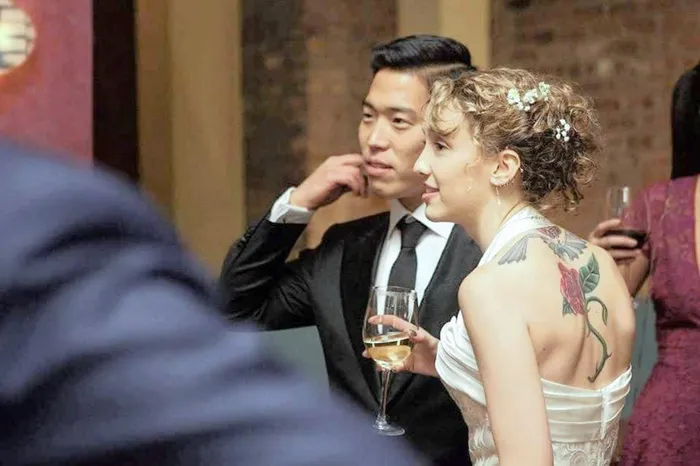Brides-to-be draw inspiration from their tattoos

Lilly Dancyger, the writer, and her husband, Soomin Dancyger, at their wedding. Picture: Miles Ranno Lilly Dancyger, the writer, and her husband, Soomin Dancyger, at their wedding. Picture: Miles Ranno
When I started getting larger, more visible tattoos, several people asked me; “What about your wedding?” - before I’d even met my husband. In cultures around the world, temporary henna tattoos are a long-standing bridal tradition. But even as permanent tattoos become increasingly accepted, there’s still a pervasive idea that to be a beautiful bride a woman must be unmarked.
And as with any backward and oppressive idea about how women should behave, there are hordes of us who delight in flouting the supposed contradiction between tattoos and a fairytale bridal glow.
The hashtag #tattooedbride appears nearly 21000 times on Instagram, and there are pages and pages of beautiful, inked-up brides on Pinterest.
When I was planning my wedding in 2015, trying to hide my tattoos never crossed my mind. In fact, I had the back of my dress lowered 5cm so it would better frame my back piece. And I took it a step further, getting one tattoo touched up and another covered up with a new design in preparation for the big day, a trip to the tattoo parlour on the same list as teeth-whitening.
My tattoos are important to me, so it only made sense that they’d be important on this big day.
Katie Wudel, a digital media editor in Los Angeles, got her tattoo of a peacock feather touched up before her wedding. The tattoo has several meanings for Wudel, as they so often do, but a main one is the remembrance of her mother, whom she lost at a young age.
“It was a way of bringing my mother into the festivities,” she says.
She also had practical reasons for her touch-up, since her feather tattoo doesn’t include any black ink, so it tends to fade especially quickly.
“I wanted every detail to be visible in photographs!” she says.
Kalia Hotchkiss, a tattoo artist based in Chisholm, Minnesota, says she does work for brides “all the time”, estimating about 50 a year in the lead-up to wedding season.
“It’s important for brides to feel complete for their wedding day,” she says. “I have brides who come in for touch-ups just to brighten their colour before the big day so everything looks crisp and fresh, and as vivid as possible.”
Dorothy Lyczek, a tattoo artist based in Brooklyn, says that cover-ups are the most common pre-wedding tattoos she does.
“I’ve touched up tattoos for clients before their wedding date, but more commonly I’ve been asked to either cover or enhance an old tattoo with a design that is more decorative or floral,” she says. “A lot of clients have used their wedding as the motivation to fix a tattoo they’ve been planning to deal with.”
Jess Zimmerman, a writer and editor based in Brooklyn, did just that. She’s getting married in May and recently covered up a tattoo on her upper back with a rose.
“The wedding lit a fire under me,” she says. “I mean a) I’m thinking about ways to bedeck myself for celebration and this piece is gonna look so good, and b) I kept catching myself thinking things like ‘I should get some kind of cosmetic procedure before the wedding’. This was my way of spending that money on a procedure on my own terms instead of the patriarchy’s.”
There is so much pressure on women to change themselves to be “perfect” on their wedding day there’s a whole industry that thrives on it.
Everyone wants to look good at their wedding, even the most anti-patriarchal feminists who have manage to escape internalising some of the most of the toxic ideas about what “looking good” means.
Tattoos are a way to hold onto some individuality through the wedding preparation. It’s a way to hold onto ourselves, and resist the “bridal” mould.